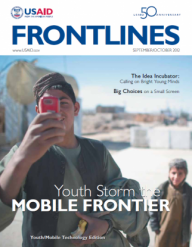FRONTLINES: What has struck you as the biggest surprise in the field of M4D [mobile for development] in recent years? How do we capitalize on it as donors and as implementing partners?
CHRIS LOCKE: What struck me the most has been the appetite for innovative services. I think where we’ve seen real innovation, whether it’s [mobile money program] M-PESA in Kenya or using mobile phones for metering for solar systems, what you’re seeing is that kind of perfect storm of a ubiquitous technology meeting a phenomenal need. For someone who has been in the industry for over 15 years now, the most innovative services I’ve seen have been the ones in the last year in developing markets.
What we can do in terms of capitalizing on that, is opening up to that innovation and recognizing that actually a lot of the best ideas for any technology that can be used in emerging markets is going to come from the people on the ground and their ideas and their experience. It’s not going to be rooms of people in Washington, or London, or Paris or Oslo drawing plans on boards and coming up with their way of thinking. This is a new and vibrant and exciting young market, and people at the cutting edge of it are on the ground in the markets and we need to create funding structures that allow that innovation to come through and succeed.
FL: You have witnessed countless examples of ‘pilot-itis.’ Yet your business approach is to reach scale as quickly as possible, to reach underserved beneficiaries but to do so in a manner that makes sense to GSMA member operators. What are the key elements necessary for breaking out of ‘pilot mode’?
Locke: The only way you reach scale, certainly in the world we are in at the moment, is to create business sustainability. The mobile operators can actually scale really quickly; [for example] we’ve got three million women in a matter of months in two markets with one operator in the mWomen program. M-PESA scaled to 70 percent of the population in five years. You can reach that scale very quickly, but mobile operators need to see how it fits into their business and how it can support their business. We try and reach scale by creating that double bottom line business plan and showing the mobile operators why they should invest in taking a service to scale, and why it’s going to be beneficial to them while also tracking the developmental impact of that product.
Related Content
FL: How do you influence change from among mobile operators so that they modify the way they do business in a manner that meets development goals, but also makes commercial sense when scaled? What can the international development community learn from this?
Locke: If you are showing them a genuine innovation that they can see has a business impact then they will change the way they work to accommodate it. The key is not thinking that the social impact alone is going to be enough to encourage a business to take something to scale. In some cases it is, but if you tie that social impact to a business benefit, then you are going to win. It goes beyond just looking at this approach for big businesses. You need to look at this for small entrepreneurs. Your aim should be creating something that goes beyond the lifespan of the money you put into it, to create something that has a sustainable business impact. We want large companies to be successful in these countries because they will contribute to the economic and social development of those countries. Therefore, we should look at how we work with them in the same way we look at how we work with and apply the same concepts to small- and micro-entrepreneurs.
FL: How has the GSMA mWomen program—one example of a USAID Global Development Alliance (GDA)—begun to do this effectively, particularly within operators that have never before considered the female demographic? Is this a potential model for redefining ‘business as usual’ to influence positive change?
Locke: Yes, I mean we’re biased, obviously. I think what’s excited us and surprised us when we’ve talked to mobile operators is by talking about this as an opportunity. And talking about this in very normal business terms, in terms of market segmentation, etc. We’ve had a huge and innovative response—Indosat’s Info Wanita project is a great example that was stimulated and supported by us as a team. But as a program, it comes from the internal activities.
When we’ve done a big group workshop with Telenor or Qtel or Etisalat, you get people excited and understanding how they can innovate in their own jobs. And that’s actually when you get really good ideas that come through. It’s not about taking a template to a company and saying, ‘If you do this, it’s going to have that.’ It’s about showing the opportunities and being really open-ended to say, ‘OK, now you tell us within your own business what’s going to work.’ You end up picking up champions within companies and people who are often far more innovative than perhaps we would be ourselves, and therefore have much bigger impact. And that’s hard, because in grant-funded programs, the temptation is always to lock down a three- to five-year plan of action and execute it. But I think we have to be a bit more open to understanding the end result is sometimes something you only really come across in deep conversations with partners.
FL: The GSMA Development Fund has now been a USAID implementer—through two GDAs and a grant—for 1.5 years. What has been the benefit(s) to working with USAID? What has been the challenge(s)?
Locke: The benefit is your scale. You’ve got a lot of clout because you’re the U.S. Government, so [that translates into] a lot of people on the ground. That is hugely beneficial. And a lot of experience: Casting a net wider across USAID, when you look at our relationship with you guys on agri[culture], we have benefitted massively from the wider agri team within USAID as thought partners, in the same way that we benefitted widely from having the gender department as thought partners.
We have a very narrow prism on the world in the way that we look at how mobile technology can be impactful, but having expertise in some of those sectors and having you guys as thought partners is really valuable. So, the experience and scale of USAID is great. I’m not going to be the first person to tell you that the bureaucracy [is debilitating]. And I think that you can frame that as a challenge. To fund ICT [information and communication technology] development projects well, you’ve got to get a fund quick and fast and have a relatively high-risk profile because, if anyone came to me now saying that they were writing a program for five-year long ‘mobile for development’ programs, I would think they were idiots.
No one has an idea of what the mobile industry is going to look like in emerging markets in five years’ time. We can make educated guesses, and we can try and influence it, but one of the things that makes it so exciting is that’s a hell of a long time in the mobile industry. And it’s a hell of a long time in the way devices evolve and the way the apps evolve, etc. So, I think to fund well in ICT, you’ve got to fund quick and fast on short-term projects and have a high-risk profile. And find those pockets of innovation or find those innovators.
FL: If you could hedge your bets, where do you see M4D heading in the next few years?
Locke: The last two or three billion people in the world to access the Internet will do it via mobile phone. We’re seeing in North Africa and other areas the impact of what happens when you give people access, not just because of the information they can get but because of the communication they can have. What interests me is when you look at rural populations, illiterate populations, in areas with potentially low 3G coverage, what does the Internet look like? We know it’s going to be transformative for those populations but what is it going to need to look like? Will people actually see access to the Internet as a spark to literacy, which some projects seem to indicate? What impact is the Internet via mobile phones going to have and how do we speed it up or enable it and make it easier, and make the reach broader and more affordable?










Comment
Make a general inquiry or suggest an improvement.